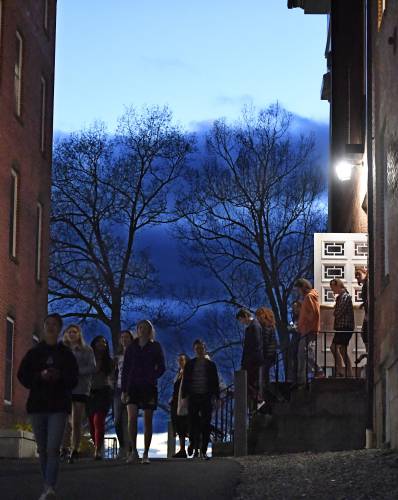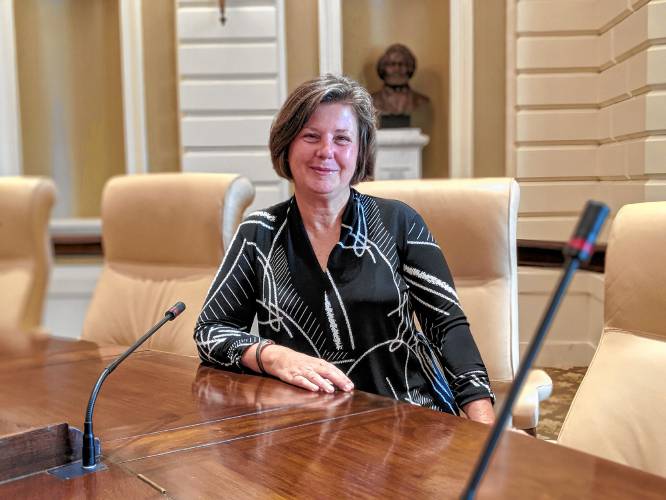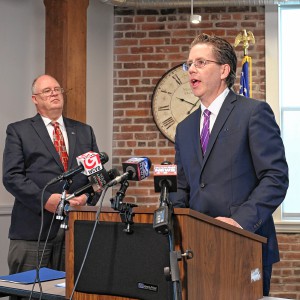Ending legacy admissions, providing menstrual products in all state buildings among many bills to emerge from Higher Education Committee
| Published: 03-05-2024 1:03 PM |
BOSTON — Area lawmakers’ proposals to require menstrual products to be available for no cost in all state buildings, establish special dorms for students in recovery, and consolidate overlapping higher education financial aid programs all cleared a key Legislative hurdle last month, as have other measures such as barring legacy admissions and establishing a program to provide food assistance to students on campus.
The bills were among about 50 that emerged from the Joint Committee on Higher Education in early Feburary in what Sen. Jo Comerford, D-Northampton, said is the “first positive step in the journey through the Legislature.” Comerford is the committee’s Senate chair.
Two of the bills are championed by Rep. Mindy Domb, D-Amherst, who introduced measures to require free menstrual products to be available in all state buildings, including those on higher education campuses. Both proposals are now before the Joint Committee on Ways and Means.
“My bills expand the settings and access to this basic hygiene item for menstruating individuals,” said Domb, adding that there is other legislation for menstrual equity filed by her colleagues that she supports.
Many college students experience financial hardship due in large part to the ongoing cost of menstruation products, Domb said.
Massachusetts does not apply sales tax to menstruation products because they are considered medical supplies. According to research commissioned by women’s intimate health brand Intimina and conducted by OnePoll, an international market research agency, the average lifetime cost of period products in the United States is around $6,000 per individual, excluding tax.
Mariangely Solis Cervera, chief of Boston‘s Equity and Inclusion Cabinet, said menstruation products can cost families at least $216 per woman annually.
“Many college students struggle financially, and by providing menstrual products, students will be able to access products without stigma to manage their periods,” said Domb.
Article continues after...
Yesterday's Most Read Articles
 Greenfield homicide victim to be memorialized in Pittsfield
Greenfield homicide victim to be memorialized in Pittsfield
 Former Greenfield man granted new trial after 1995 murder conviction, walks free
Former Greenfield man granted new trial after 1995 murder conviction, walks free
 On The Ridge with Joe Judd: What time should you turkey hunt?
On The Ridge with Joe Judd: What time should you turkey hunt?
 Judge sets bail for Millers Falls assault suspects
Judge sets bail for Millers Falls assault suspects
 Franklin Tech student welds artistic bench for French King Bridge
Franklin Tech student welds artistic bench for French King Bridge
 As I See It: Between Israel and Palestine: Which side should we be on, and why?
As I See It: Between Israel and Palestine: Which side should we be on, and why?
Domb added that a group from another University of Massachusetts campus motivated her to concentrate on the issue.
At the beginning of last year, UMass Dartmouth’s Center for Women, collaborating with the Gender and Sexuality and Student Government Association, launched the Menstrual Access Pilot Program, helping students and staff at school find qualified and ample amenities in bathrooms.
“Students may have to miss class or face other challenges that prevent academic success without access to menstrual products,” said Domb.
This is not the first time lawmakers have offered proposals related to menstruation supplies as a public service has been introduced.
The I AM Bill, which won unanimous Senate approval last October, aims to provide free menstrual products across the commonwealth. Dignity Matters, a Massachusetts-based nonprofit organization, said the bill addresses the urgent need in the community and brought attention to the state’s pervasive period poverty problem by distributing close to 3 million menstrual care supplies.
“By providing them on campuses and in state buildings, we can ensure that people have access to these products, allowing them to properly care for their bodily functions,” said Domb.
Bills filed by other area lawmakers have advanced.
Among those are a bill co-sponsored by state Sen. John Velis, D-Westfield, calling on public higher education campuses to establish recovery dorms or wings that provide a supportive environment for students in recovery.
The legislation also provides for dorm residential advisers to have access to Naloxone or other opioid antagonists to be used in cases of overdoses.
Comerford has co-sponsored legislation that would direct the Department of Higher Education to consolidate and simplify an array of overlapping higher education financial aid programs, as well as an act expanding access to waivers to higher education tuition and fees for adopted foster children.
Meanwhile, the legacy admissions bill would prohibit public and private colleges and universities from giving preference for admission to applicants who are related to a former or current student. The bill also calls for a study of binding early admission policies. The legislation is sponsored by Sens. Lydia Edwards and Pavel Payano and Reps. Michael Moran and Simon Cataldo.
Comerford emphasized that hunger is another key issue on campus, a concern that was addressed in part when Gov. Maura Healey signed the fiscal 2024 budget into law.
“I can’t rank the bills, because that’s not what the Joint Committee on Higher Education can do,” said Comerford. “What we do is put out the bills that we think should be put favorably, and the other ones we won’t put out.”
Xinyi Yang writes for the Recorder from the Boston University State House Program.



 Fogbuster Coffee Works, formerly Pierce Brothers, celebrating 30 years in business
Fogbuster Coffee Works, formerly Pierce Brothers, celebrating 30 years in business 1989 homicide victim found in Warwick ID’d through genetic testing, but some mysteries remain
1989 homicide victim found in Warwick ID’d through genetic testing, but some mysteries remain Doors open at Tilton Library’s temporary home at South Deerfield Congregational Church
Doors open at Tilton Library’s temporary home at South Deerfield Congregational Church DA to announce breakthrough in 1989 unsolved homicide in Warwick
DA to announce breakthrough in 1989 unsolved homicide in Warwick
